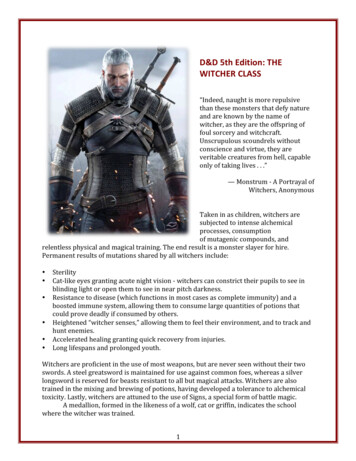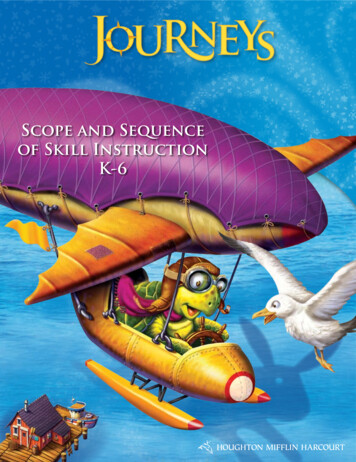
Transcription
Continue
The witcher blood of elves pdf download windows 7 full crackGetting to grips with how to read The Witcher books in order will serve all you bookworms well as you endure the long wait for The Witcher season 3 to drop on Netflix in 2023.By far one of the best Netflix shows so far, The Witcher books are just as outstanding, so if you're a fan of the hit series staring starring Henry Cavill as Geralt of Rivia, thentrust us, you're going to want to devour these fantasy novels by Polish author Andrzej Sapkowski.The Witcher Season 2 was a huge hit for Netflix and although we don't know tons about The Witcher Season 3 yet, we're expecting it to bring more action as we follow the adventures of the witcher Geralt, a mutated monster hunter who struggles to findhis place in a wicked world. But The Witcher existed for its fans long before it became a TV show. Sapkowski created monster-hunting Geralt of Rivia as part of a magazine's short story competition all the way back in the mid-'80s and would you believe he only finished third? Not to worry, Sapkowski ended up taking all those stories and turning theminto his now highly successful and much-loved fantasy book series. When it comes to how to read The Witcher books in order, you've got a couple of options. The series includes five saga novels, two prequels and a standalone and while it's certainly not the most complicated fantasy series out there by any stretch of the imagination, and you can eitherfollow along by publication order or by the order they come in the Continent’s chronology.With the books falling anywhere in the region of 300 to 550 pages, you can either purchase them in paperback or hardback or, if you travel frequently, why not treat yourself to the best Kindle so that you can take the entire series with you wherever you go?Below we talk you through how to read The Witcher books in order, as well as ranking them from best to worst based on their reader ratings on Goodreads. Let's take a look.The Witcher books: reading order explainedWhen it comes to figuring out how to read The Witcher books in order, there are a few things you need to know:The short stories ofThe Last Wish come first in the chronology of The Witcher universe, and provide the ideal introduction to Geralt of Rivia, sorceresses Yennefer of Vengerberg and Triss Merigold, and singing bard Dandelion (renamed Jaskier in Netflix’s The Witcher TV series). Indeed, events in the stories ‘The Witcher’, ‘The Lesser Evil’, ‘A Question of Price’, ‘TheEdge of the World’ and ‘The Last Wish’ form the basis of Geralt’s arc in the first season of the Netflix show – we meet the Striga, learn how Geralt became known as ‘the butcher of Blaviken’, and see the origin of the ‘Law of Surprise’ that ties him to Princess Ciri. Although the standalone Season of Storms was published after the five saga novels, theevents of the book take place around the same time period as The Last Wish. It’s not essential to the overall story arc, but completists may find hints of things that will later come to pass in the main saga.The stories in Sword of Destiny, meanwhile, introduce the young Ciri. The book’s final tale, ‘Something More’, shows the fall of Cintra (a key eventin the first episode of The Witcher TV show), and serves as a prequel to the quintet of saga novels.The five saga novels, then, are Blood of Elves, Time of Contempt, Baptism of Fire, The Tower of the Swallow and The Lady of the Lake.With much of season one of the TV series adapted from the two short story collections, the second season is where theNetflix show will get deep into adapting The Witcher saga novels.How to read The Witcher books in release order(Image credit: Netflix)The first Witcher books debuted in the early '90s in Sapkowski’s native Poland, but the rest of the world was a little slow to catch on to Geralt of Rivia. It wasn’t until the English version of The Last Wish waspublished in 2007 – the year that the first Witcher videogame was released – that Anglophone readers got their first chance to read the books. Danusia Stok translated the first two English releases before David French took over for the remaining six.We’ve gone with the original Polish publication order below to help you read The Witcher books inorder, which differs slightly from the English-language releases – while Sword of Destiny was the first (still available) collection of Witcher short stories published in Poland, The Last Wish was the first release in English. (It’s interesting to note, however, that four of the short stories in The Last Wish had previously been published in a now out-of-print1990 release, simply called The Witcher.)These short story collections were followed by the five novels of the main Witcher saga, as mentioned earlier (Blood of Elves, Time of Contempt, Baptism of Fire, The Tower of the Swallow, The Lady of the Lake), and standalone novel Season of Storms.Short story collections:Sword of Destiny (original Polishversion: 1992/English: 2015) The Last Wish (Polish: 1993/English: 2007) The Witcher Saga:Blood of Elves (Polish: 1994/English: 2008) Time of Contempt (Polish: 1995/English: 2013) Baptism of Fire (Polish: 1996/English: 2014) The Tower of the Swallow (Polish: 1997/English: 2016) The Lady of the Lake (Polish: 1999/English: 2017) StandalonenovelSeason of Storms (Polish: 2013/English: 2018) The Witcher comics explained: are they canon?(Image credit: Dark Horse Comics)If you still haven’t seen enough of the Continent after watching the Netflix show, reading Andrzej Sapkowski’s books, and adventuring your way through the games, there’s even more Witcher storytelling out there, asDark Horse have published various Witcher comics and graphic novels. They’re not written by Sapkowski and although Fox Children is based on a chapter from Season of Storms, they’re set in the continuity of the games rather than the books. All are available to buy from Dark Horse as standalone comics, or collected together as graphic novels. TheWitcher: House of Glass (by Paul Tobin and Joe Querio, published 2014) The Witcher: Fox Children (by Paul Tobin and Joe Querio, published 2015) The Witcher: Curse of Crows (by Paul Tobin and Piotr Kowalski, published 2016-2017) The Witcher: Of Flesh and Flame (by Aleksandra Motyka and Marianna Strychowska, published 2018-2019) The bestWitcher books: ranking the source materialGoing on the reader rankings on Goodreads.com, The Witcher books are remarkably consistent in terms of quality. Season of Storms, originally published 14 years after Sapkowski had completed his saga, comes bottom of the pile, which hints that some of the author’s magic had dissipated in the interveningyears. And the five books translated by David French come ahead of the two handled by Danusia Stok, suggesting that readers might prefer French’s style. But seeing as even the lowest-ranked title receives a highly respectable 3.95 out of 5, fantasy fans are unlikely to be disappointed by any of Sapkowski’s novels. The characters and events in thisbook are fictitious. Any similarity to realpersons, living or dead, is coincidental and not intended by the author.Original text copyright Andrzej Sapkowski 1994English translation copyright Danusia Stok 2008All rights reserved. Except as permitted under the U.S. Copyright Act of1976, no part of this publication may be reproduced, distributed,ortransmitted in any form or by any means, or stored in a database or retrievalsystem, without the prior written permission of the publisher.OrbitHachette Book Group237 Park Avenue, New York, NY 10017Visit our Web site at www.HachetteBookGroup.comOrbit is an imprint of Hachette Book Group. The Orbit name and logo aretrademarks of Little,Brown Book Group Limited.Originally published in hardcover by Gollancz in the UK, 2008First eBook Edition: May 2009ISBN: 978-0-316-07371-4ContentsCopyright PageCHAPTER ONECHAPTER TWOCHAPTER THREECHAPTER FOURCHAPTER FIVECHAPTER SIXCHAPTER SEVENExtrasMeet the AuthorTHE LAST WISH“I’d be proud,” she saidquietly, lowering her head. “I’d be proud and happy to fight at your side.” “I believe that. But I’m not gallant enough. Nor valiant enough. I’m notsuited to be a soldier or a hero. And having an acute fear of pain, mutilationand death is not the only reason. You can’t stop a soldier from beingfrightened but you can give him motivation to help himovercome that fear.I have no such motivation. I can’t have. I’m a witcher: an artificially createdmutant. I kill monsters for money. I defend children when their parents payme to. If Nilfgaardian parents pay me, I’ll defend Nilfgaardian children.And even if the world lies in ruin—which does not seem likely to me—I’llcarry on killing monsters in the ruinsof this world until some monster killsme. That is my fate, my reason, my life and my attitude to the world. And itis not what I chose. It was chosen for me.” “But I don’t want to die in awar, because they’re not my wars.” Praise for Andrzej Sapkowski:“Sapkowski has a phenomenal gift for narrative, for inventing sensationalevents, creating asuggestive mood, and building up the suspense. Alongwith a dazzling, slightly cynical sense of humor.” —Jacek Sieradzki, Polityka“The character interplay is complex, unsentimental and anchored in brutalshared history. All bodes well for twisty plotting in future volumes.” —SFX on Blood of ElvesBooks by Andrzej Sapkowski The Last Wish Blood ofElvesVerily I say unto you, the era of the sword and axe is nigh, the era of thewolf’s blizzard. The Time of the White Chill and the White Light is nigh, theTime of Madness and the Time of Contempt: Tedd Deireádh, the Time ofEnd. The world will die amidst frost and be reborn with the new sun. It willbe reborn of the Elder Blood, of Hen Ichaer, of theseed that has been sown.A seed which will not sprout but will burst into flame. Ess’tuath esse! Thus it shall be! Watch for the signs! What signs theseshall be, I say unto you: first the earth will flow with the blood of AenSeidhe, the Blood of Elves Aen Ithlinnespeath, Ithlinne Aegli aep Aevenien’s prophecyCHAPTER ONEThe town was in flames. Thenarrow streets leading to the moat and the first terrace belchedsmoke and embers, flames devouring the densely clustered thatched housesand licking at the castle walls. From the west, from the harbour gate, thescreams and clamour of vicious battle and the dull blows of a battering ramsmashing against the walls grew ever louder. Their attackershad surrounded them unexpectedly, shattering thebarricades which had been held by no more than a few soldiers, a handful oftownsmen carrying halberds and some crossbowmen from the guild. Theirhorses, decked out in flowing black caparisons, flew over the barricadeslike spectres, their riders’ bright, glistening blades sowing death amongstthefleeing defenders. Ciri felt the knight who carried her before him on his saddle abruptlyspur his horse. She heard his cry. “Hold on,” he shouted. “Hold on!” Other knights wearing the colours of Cintra overtook them, sparring,even in full flight, with the Nilfgaardians. Ciri caught a glimpse of theskirmish from the corner of her eye – the crazed swirl ofblue-gold andblack cloaks amidst the clash of steel, the clatter of blades against shields,the neighing of horses— Shouts. No, not shouts. Screams. “Hold on!” Fear. With every jolt, every jerk, every leap of the horse pain shotthrough her hands as she clutched at the reins. Her legs contracted painfully,unable to find support, her eyes watered from thesmoke. The arm aroundher suffocated her, choking her, the force compressing her ribs. All aroundher screaming such as she had never before heard grew louder. What mustone do to a man to make him scream so? Fear. Overpowering, paralysing, choking fear. Again the clash of iron, the grunts and snorts of the horses. The houseswhirled around herand suddenly she could see windows belching firewhere a moment before there’d been nothing but a muddy little streetstrewn with corpses and cluttered with the abandoned possessions of thefleeing population. All at once the knight at her back was wracked by astrange wheezing cough. Blood spurted over the hands grasping the reins.Morescreams. Arrows whistled past. A fall, a shock, painful bruising against armour. Hooves pounded pasther, a horse’s belly and a frayed girth flashing by above her head, thenanother horse’s belly and a flowing black caparison. Grunts of exertion, likea lumberjack’s when chopping wood. But this isn’t wood; it’s iron againstiron. A shout, muffled and dull,and something huge and black collapsedinto the mud next to her with a splash, spurting blood. An armoured footquivered, thrashed, goring the earth with an enormous spur. A jerk. Some force plucked her up, pulled her onto another saddle. Holdon! Again the bone-shaking speed, the mad gallop. Arms and legsdesperately searching for support. Thehorse rears. Hold on! There is nosupport. There is no There is no There is blood. The horse falls. It’simpossible to jump aside, no way to break free, to escape the tight embraceof these chainmail-clad arms. There is no way to avoid the blood pouringonto her head and over her shoulders. A jolt, the squelch of mud, a violent collision with theground,horrifically still after the furious ride. The horse’s harrowing wheezes andsqueals as it tries to regain its feet. The pounding of horseshoes, fetlocksand hooves flashing past. Black caparisons and cloaks. Shouting. The street is on fire, a roaring red wall of flame. Silhouetted before it, arider towers over the flaming roofs, enormous. His blackcaparisoned horseprances, tosses its head, neighs. The rider stares down at her. Ciri sees his eyes gleaming through the slitin his huge helmet, framed by a bird of prey’s wings. She sees the firereflected in the broad blade of the sword held in his lowered hand. The rider looks at her. Ciri is unable to move. The dead man’smotionless arms wrappedaround her waist hold her down. She is locked inplace by something heavy and wet with blood, something which is lyingacross her thigh, pinning her to the ground. And she is frozen in fear: a terrible fear which turns her entrails insideout, which deafens Ciri to the screams of the wounded horse, the roar of theblaze, the cries of dying people and thepounding drums. The only thingwhich exists, which counts, which still has any meaning, is fear. Fearembodied in the figure of a black knight wearing a helmet decorated withfeathers frozen against the wall of raging, red flames. The rider spurs his horse, the wings on his helmet fluttering as the birdof prey takes to flight, launching itself to attack itshelpless victim,paralysed with fear. The bird – or maybe the knight – screeches terrifyingly,cruelly, triumphantly. A black horse, black armour, a black flowing cloak,and behind this – flames. A sea of flames. Fear. The bird shrieks. The wings beat, feathers slap against her face. Fear! Help! Why doesn’t anyone help me? Alone, weak, helpless – Ican’tmove, can’t force a sound from my constricted throat. Why does no onecome to help me? I’m terrified! Eyes blaze through the slit in the huge winged helmet. The black cloakveils everything— “Ciri!” She woke, numb and drenched in sweat, with her scream – the screamwhich had woken her – still hanging in the air, still vibratingsomewherewithin her, beneath her breast-bone and burning against her parched throat.Her hands ached, clenched around the blanket; her back ached “Ciri. Calm down.” The night was dark and windy, the crowns of the surrounding pine treesrustling steadily and melodiously, their limbs and trunks creaking in thewind. There was no malevolentfire, no screams, only this gentle lullaby.Beside her the campfire flickered with light and warmth, its reflected flamesglowing from harness buckles, gleaming red in the leather-wrapped andiron-banded hilt of a sword leaning against a saddle on the ground. Therewas no other fire and no other iron. The hand against her cheek smelled ofleather andashes. Not of blood. “Geralt—” “It was just a dream. A bad dream.”Ciri shuddered violently, curling her arms and legs up tight. A dream. Just a dream. The campfire had already died down; the birch logs were red andluminous, occasionally crackling, giving off tiny spurts of blue flame whichilluminated the white hair and sharp profile of the manwrapping a blanketand sheepskin around her. “Geralt, I—” “I’m right here. Sleep, Ciri. You have to rest. We’ve still a long wayahead of us.” I can hear music, she thought suddenly. Amidst the rustling of thetrees there’s music. Lute music. And voices. The Princess of Cintra Achild of destiny A child of Elder Blood, the blood of elves. Geralt ofRivia,the White Wolf, and his destiny. No, no, that’s a legend. A poet’s invention.The princess is dead. She was killed in the town streets while trying toescape Hold on !Hold “Geralt?” “What, Ciri?” “What did he do to me? What happened? What did he do to me?” “Who?” “The knight The black knight with feathers on his helmet Ican’tremember anything. He shouted and looked at me. I can’t remember whathappened. Only that I was frightened I was so frightened ” The man leaned over her, the flame of the campfire sparkling in his eyes.They were strange eyes. Very strange. Ciri had been frightened of them, shehadn’t liked meeting his gaze. But that had been a longtime ago. A verylong time ago. “I can’t remember anything,” she whispered, searching for his hand, astough and coarse as raw wood. “The black knight—” “It was a dream. Sleep peacefully. It won’t come back.” Ciri had heard such reassurances in the past. They had been repeated toher endlessly; many, many times she had been offered comfortingwordswhen her screams had woken her during the night. But this time it wasdifferent. Now she believed it. Because it was Geralt of Rivia, the WhiteWolf, the Witcher, who said it. The man who was her destiny. The one forwhom she was destined. Geralt the Witcher, who had found her surroundedby war, death and despair, who had taken her withhim and promised theywould never part. She fell asleep holding tight to his hand.The bard finished the song. Tilting his head a little he repeated the ballad’srefrain on his lute, delicately, softly, a single tone higher than the apprenticeaccompanying him. No one said a word. Nothing but the subsiding music and the whisperingleaves and squeakingboughs of the enormous oak could be heard. Then, allof a sudden, a goat tethered to one of the carts which circled the ancient treebleated lengthily. At that moment, as if given a signal, one of the menseated in the large semi-circular audience stood up. Throwing his cobaltblue cloak with gold braid trim back over his shoulder, he gave a stiff,dignifiedbow. “Thank you, Master Dandilion,” he said, his voice resonant withoutbeing loud. “Allow me, Radcliffe of Oxenfurt, Master of the Arcana, toexpress what I am sure is the opinion of everyone here present and utterwords of gratitude and appreciation for your fine art and skill.” The wizard ran his gaze over those assembled – an audience of well overahundred people – seated on the ground, on carts, or standing in a tightsemi-circle facing the foot of the oak. They nodded and whispered amongstthemselves. Several people began to applaud while others greeted the singerwith upraised hands. Women, touched by the music, sniffed and wiped theireyes on whatever came to hand, which differedaccording to their standing,profession and wealth: peasant women used their forearms or the backs oftheir hands, merchants’ wives dabbed their eyes with linen handkerchiefswhile elves and noblewomen used kerchiefs of the finest tight-wovencotton, and Baron Vilibert’s three daughters, who had, along with the rest ofhis retinue, halted their falconhunt to attend the famous troubadour’sperformance, blew their noses loudly and sonorously into elegant mould-green cashmere scarves. “It would not be an exaggeration to say,” continued the wizard, “that youhave moved us deeply, Master Dandilion. You have prompted us toreflection and thought; you have stirred our hearts. Allow me to expressourgratitude, and our respect.”The troubadour stood and took a bow, sweeping the heron feather pinnedto his fashionable hat across his knees. His apprentice broke off his playing,grinned and bowed too, until Dandilion glared at him sternly and snappedsomething under his breath. The boy lowered his head and returned to softlystrumming his lutestrings. The assembly stirred to life. The merchants travelling in the caravanwhispered amongst themselves and then rolled a sizable cask of beer out tothe foot of the oak tree. Wizard Radcliffe lost himself in quiet conversationwith Baron Vilibert. Having blown their noses, the baron’s daughters gazedat Dandilion in adoration – which went entirelyunnoticed by the bard,engrossed as he was in smiling, winking and flashing his teeth at a haughty,silent group of roving elves, and at one of them in particular: a dark-haired,large-eyed beauty sporting a tiny ermine cap. Dandilion had rivals for herattention – the elf, with her huge eyes and beautiful toque hat, had caughthis audience’s interest aswell, and a number of knights, students andgoliards were paying court to her with their eyes. The elf clearly enjoyedthe attention, picking at the lace cuffs of her chemise and fluttering hereyelashes, but the group of elves with her surrounded her on all sides, notbothering to hide their antipathy towards her admirers. The glade beneath Bleobheris,the great oak, was a place of frequentrallies, a well-known travellers’ resting place and meeting ground forwanderers, and was famous for its tolerance and openness. The druidsprotecting the ancient tree called it the Seat of Friendship and willinglywelcomed all comers. But even during an event as exceptional as the world-famous troubadour’s justconcluded performance the travellers kept tothemselves, remaining in clearly delineated groups. Elves stayed with elves.Dwarfish craftsmen gathered with their kin, who were often hired to protectthe merchant caravans and were armed to the teeth. Their groups toleratedat best the gnome miners and halfling farmers who camped beside them.Allnon-humans were uniformly distant towards humans. The humans repaid inkind, but were not seen to mix amongst themselves either. Nobility lookeddown on the merchants and travelling salesmen with open scorn, whilesoldiers and mercenaries distanced themselves from shepherds and theirreeking sheepskins. The few wizards and their discipleskept themselvesentirely apart from the others, and bestowed their arrogance on everyone inequal parts. A tight-knit, dark and silent group of peasants lurked in thebackground. Resembling a forest with their rakes, pitchforks and flailspoking above their heads, they were ignored by all and sundry. The exception, as ever, was the children. Freed fromthe constraints ofsilence which had been enforced during the bard’s performance, thechildren dashed into the woods with wild cries, and enthusiasticallyimmersed themselves in a game whose rules were incomprehensible to allthose who had bidden farewell to the happy years of childhood. Children ofelves, dwarves, halflings, gnomes, half-elves,quarter-elves and toddlers ofmysterious provenance neither knew nor recognised racial or socialdivisions. At least, not yet. “Indeed!” shouted one of the knights present in the glade, who was asthin as a beanpole and wearing a red and black tunic emblazoned with threelions passant. “The wizard speaks the truth! The ballads were beautiful.Upon myword, honourable Dandilion, if you ever pass near Baldhorn, mylord’s castle, stop by without a moment’s hesitation. You will be welcomedlike a prince– what am I saying? Welcomed like King Vizimir himself! Iswear on my sword, I have heard many a minstrel, but none even cameclose to being your equal, master. Accept the respect and tributes thoseofus born to knighthood, and those of us appointed to the position, pay toyour skills!” Flawlessly sensing the opportune moment, the troubadour winked at hisapprentice. The boy set his lute aside and picked up a little casket whichserved as a collection box for the audience’s more measurable expressionsof appreciation. He hesitated, ran his eyesover the crowd, then replaced thelittle casket and grabbed a large bucket standing nearby. Master Dandilionbestowed an approving smile on the young man for his prudence. “Master!” shouted a sizeable woman sitting on a cart, the sides of whichwere painted with a sign for “Vera Loewenhaupt and Sons,” and which wasfull of wickerwork. Her sons,nowhere to be seen, were no doubt busywasting away their mother’s hard-earned fortune. “Master Dandilion, whatis this? Are you going to leave us in suspense? That can’t be the end of yourballad? Sing to us of what happened next!” “Songs and ballads” – the musician bowed – “never end, dear lady,because poetry is eternal and immortal, it knowsno beginning, it knows noend—” “But what happened next?” The tradeswoman didn’t give up, generouslyrattling coins into the bucket Dandilion’s apprentice held out to her. “Atleast tell us about it, even if you have no wish to sing of it. Your songsmention no names, but we know the witcher you sing of is no other than thefamous Geralt of Rivia, andthe enchantress for whom he burns with love isthe equally famous Yennefer. And the Child Surprise, destined for thewitcher and sworn to him from birth, is Cirilla, the unfortunate Princess ofCintra, the town destroyed by the Invaders. Am I right?” Dandilion smiled, remaining enigmatic and aloof. “I sing of universalmatters, my dear, generous lady,”he stated. “Of emotions which anyone canexperience. Not about specific people.” “Oh, come on!” yelled a voice from the crowd. “Everyone knows thosesongs are about Geralt the Witcher!” “Yes, yes!” squealed Baron Vilibert’s daughters in chorus, drying theirsodden scarves. “Sing on, Master Dandilion! What happened next? Did thewitcher andYennefer the Enchantress find each other in the end? And didthey love each other? Were they happy? We want to know!” “Enough!” roared the dwarf leader with a growl in his throat, shakinghis mighty waist-length, red beard. “It’s crap – all these princesses,sorceresses, destiny, love and women’s fanciful tales. If you’ll pardon theexpression, greatpoet, it’s all lies, just a poetic invention to make the storyprettier and more touching. But of the deeds of war – the massacre andplunder of Cintra, the battles of Marnadal and Sodden – you did sing thatmightily, Dandilion! There’s no regrets in parting with silver for such asong, a joy to a warrior’s heart! And I, Sheldon Skaggs, declare there’s notanounce of lies in what you say – and I can tell the lies from the truthbecause I was there at Sodden. I stood against the Nilfgaard invaders withan axe in my hand ” “I, Donimir of Troy,” shouted the thin knight with three lions passantblazoned across his tunic, “was at both battles of Sodden! But I did not seeyou there, sir dwarf!” “No doubt because youwere looking after the supply train!” SheldonSkaggs retorted. “While I was in the front line where things got hot!” “Mind your tongue, beardy!” said Donimir of Troy flushing, hitching uphis sword belt. “And who you’re speaking to!” “Have a care yourself!” The dwarf whacked his palm against the axewedged in his belt, turned to his companions andgrinned. “Did you see himthere? Frigging knight! See his coat of arms? Ha! Three lions on a shield?Two shitting and the third snarling!”“Peace, peace!” A grey-haired druid in a white cloak averted troublewith a sharp, authoritative voice. “This is not fitting, gentlemen! Not here,under Bleobheris’ crown, an oak older than all the disputes and quarrelsofthe world! And not in Poet Dandilion’s presence, from whose ballads weought to learn of love, not contention.” “Quite so!” a short, fat priest with a face glistening with sweat secondedthe druid. “You look but have no eyes, you listen but have deaf ears.Because divine love is not in you, you are like empty barrels—” “Speaking of barrels,” squeaked along-nosed gnome from his cart,painted with a sign for “Iron hardware, manufacture and sale”, “roll anotherout, guildsmen! Poet Dandilion’s throat is surely dry – and ours too, fromall these emotions!” “—Verily, like empty barrels, I tell ye!” The priest, determined not to beput off, drowned out the ironware gnome. “You have understood nothingofMaster Dandilion’s ballad, you have learned nothing! You did not see thatthese ballads speak of man’s fate, that we are no more than toys in the handsof the gods, our lands no more than their playground. The ballads aboutdestiny portrayed the destinies of us all, and the legend of Geralt theWitcher and Princess Cirilla – although it is set against thetrue backgroundof that war – is, after all, a mere metaphor, the creation of a poet’simagination designed to help us—” “You’re talking rubbish, holy man!” hollered Vera Loewenhaupt fromthe heights of her cart. “What legend? What imaginative creation? You maynot know him, but I know Geralt of Rivia. I saw him with my own eyes inWyzima, whenhe broke the spell on King Foltest’s daughter. And I met himagain later on the Merchants’ Trail, where, at Gildia’s request, he slew aferocious griffin which was preying on the caravans and thus saved the livesof many good people. No. This is no legend or fairy-tale. It is the truth, thesincere truth, which Master Dandilion sang for us.” “I second that,”said a slender female warrior with her black hairsmoothly brushed back and plaited into a thick braid. “I, Rayla of Lyria,also know Geralt the White Wolf, the famous slayer of monsters. And I’vemet the enchantress, Lady Yennefer, on several occasions – I used to visitAedirn and her home town of Vengerberg. I don’t know anything abouttheir being inlove, though.” “But it has to be true,” the attractive elf in the ermine toque suddenlysaid in a melodious voice. “Such a beautiful ballad
The witcher blood of elves pdf download windows 7 full crack Getting to grips with how to read The Witcher books in order will serve all you bookworms well as you endure the long wait for The Witcher season 3 to drop on Netflix in 2023.By far one of the best Netflix shows so far, The Witcher books are just as outstanding, so if you're a fan of the hit series staring starring Henry Cavill as .










